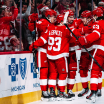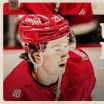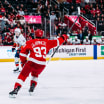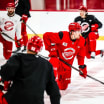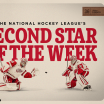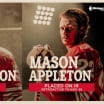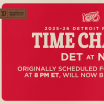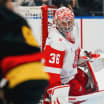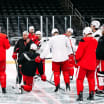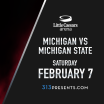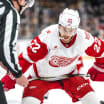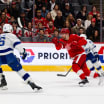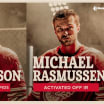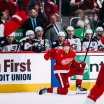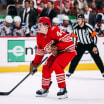DETROIT -- Many years from now sports historians will chronicle the incredible Red Wings teams that called Joe Louis Arena home. The Joe will always be regarded as a hockey Mecca.
Hall of Fame players, Stanley Cup Championship teams and legendary coaches are all part of the old barn's lore.
Basketball at the Joe: quality over quantity
A tractor pull, the SIlverdome roof collapsing and Mariah Carey are all part of the Joe's basketball history
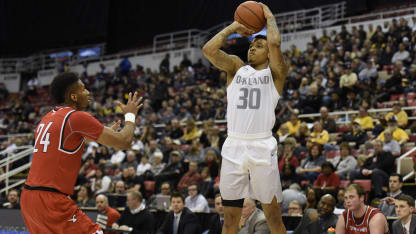
© Jose Juarez/Oakland University Athletics
By
Arthur J. Regner @ArthurJRegner / DetroitRedWings.com
Yet when the Horizon League's basketball champion is crowned on Tuesday evening at the Joe, it will mark the end of an illustrious basketball era.
It began on December 12, 1979 when the Detroit Titans and the Michigan Wolverines clashed on the hardwood.
The building was still coming together with the interior of the arena still needing a coat of paint or two, but the 12,319 basketball fans in attendance at the first event ever held at the Joe didn't seem to mind.
"My first opportunity to play in downtown Detroit was going to be at the Joe Louis Arena," said Earl Cureton, former Titan and Detroit Piston. "I was pretty excited about it, having that game against Michigan down there. "It didn't turn out the way I wanted it to, but going to downtown Detroit and having the fans being able to watch us play in a brand new arena and being in the first event to be played was a real hype moment for our team."
Cureton was actually part of the first basket ever scored at the Joe, when he dished off a pass to teammate Joe Kopicki, who banked in a 5-foot jump shot.
"Yeah, I caught Joe Kopicki with a pass underneath and he was able to score the first basket. I got the first assist and he got the first bucket down at Joe Louis Arena," Cureton recalled.
However, what really stood out to Cureton was not being part of the first points ever scored at the Joe, but the atmosphere inside the arena.
"The way they had it set up, the fans were right there on top of us; it felt like a home arena. It was exciting to just be in the inner city," Cureton said. "I remember all of my friends, people I grew up with, I knew a lot of the security guards. It felt like home going there because when you walked in you were familiar with everybody, you knew everybody."
Michigan beat the Titans in that first game 85-72, with Mike McGee leading the Wolverines with 36 points.
"Don Canham, (Michigan's athletic director) was good friends with Lincoln Cavalieri, who worked for the Norris family (who owned the Red Wings), so with Joe Louis coming in, he (Cavalieri) saw an opportunity because Canham liked to take games out (of Ann Arbor)," said Bruce Madej, Michigan's former longtime sports information director, when asked how Michigan became involved in playing the first game at the Joe.
Madej was an assistant sports information director for the Wolverines in charge of basketball back in 1979.
"Canham had a knack for taking games and trying different things, he was a marketing guy," Madej said. "That's how it happened. We had a game against U of D and it worked out perfectly.
"It was a great opportunity for Michigan to get their name in as one of the first teams to play at Joe Louis Arena, that's what Canham wanted. He wanted the Michigan name placed in every nook and cranny he could possibly find that was interesting."
Each player from the Titans and Wolverines received a plaque commemorating the event, but at the time the significance of the game really didn't sink in for Cureton.
"You don't realize what you're doing when you're actually doing it," Cureton said. "We didn't know the importance of playing the first game, we took the plaque, we were just excited to be there at Joe Louis Arena in downtown Detroit."
Detroit Mercy has played 12 times at the Joe over the years, hosting big-name opponents like Marquette, Syracuse, Xavier and Michigan State.
The Titans' final game was last Friday when they lost to Milwaukee in the first round of the Horizon League Tournament.
They finish with a 4-8 overall record in games played at Joe Louis Arena.
Many basketball fans agree that one of the most memorable games ever played at the Joe and certainly the greatest basketball game ever played there was the deciding Game 5 of the 1984 playoffs between the Pistons and the New York Knicks.
The Pistons were forced to move the game to Joe Louis Arena because the Pontiac Silverdome had scheduled a tractor pull, which in those days pulled in 60-80,000 people at the Pistons' home.
"We spent five years just trying to get to the playoffs, it had been forever since we had gotten there and we were going to be playing the deciding game on a neutral court," said Tom Wilson, Olympia Entertainment president and CEO, who was the Pistons president and CEO back in 1984. "Nobody was very happy about that, but it was sort of our coming out party and it turned out to be the greatest game I've ever seen.
"It was a hundred degrees in that building, it was a game that was back and forth but you finally conceded it late in the fourth quarter and then Isiah just worked a miracle. It was the most amazing performance I've ever seen in my career."
Thomas scored 16 points in 93 seconds to send the game into overtime and even though the Pistons would eventually lose, 127-123, Wilson began to see the benefits of playing in an arena instead of an "airplane hangar," which is what he called the Silverdome.
Cureton also remembers playing in game 5 and says the environment at the Joe was intense.
"That was one of the most exciting games I ever played in," Cureton said. "The arena was jam-packed. The way it unfolded with Bernard King, Bernard had an outstanding series and Isiah going crazy at the end of that game 5. I've always felt we should have won, but that game the fans were incredible, they were on top of us, you could hardly hear anything in that building. The excitement level was just off the chain.
"I remember how tough it was going up against Bernard King. The sad part about it for me I had to guard Bernard King on the last play of the game, he actually hit the last shot over me to win that game. That's a memory that will stick with me for the rest of my life."
Little did the Pistons know they would be back at Joe Louis Arena the following season when the Silverdome roof collapsed.
Detroit found itself playing 15 games at the Joe, including their entire playoff series against the Boston Celtics.
But the Pistons actually thought playing at the Joe helped them out because of the rowdy Joe Louis Arena crowds.
The previous year, they believed that their home court advantage was taken away because the Knicks were not used to the shooting background in a stadium but the Pistons were extremely comfortable shooting at the Silverdome.
"We had great crowds at the Silverdome; I remember we had over 60,000 people at the Silverdome to watch a basketball game," Cureton said. "But to come downtown, the fans were right on top of you. I remember speaking to the Boston Celtics about playing at the Joe Louis Arena and I think they were kind of intimidated by the fans.
"The fans were right on them, breathing on their necks, right in back of them and right on top of them. We didn't have that type of closeness at the Silverdome like you had playing at the Joe Louis Arena.
"There was an intimidation factor for us playing some of those playoff games at the Joe Louis Arena. The way the city treated us, the way they came out and supported us for those games was just overwhelming."
Again the Pistons would lose their playoff series, 4-2, to the Celtics, but the team was growing up and proved to themselves they could compete with the NBA's elite teams.
It also solidified an idea that had been brewing in Wilson's mind since the playoff game against the Knicks.
"When the roof caved in at the Silverdome, we had to play down there (Joe Louis Arena) for weeks and that really crystallized everything we wanted to do and led to the Palace," Wilson said. One day Wilson was walking around the concourse at the Joe and asked an associate, "Why don't they put suites here (on the concourse level)? Why do they always put them at the top of the building? Wouldn't you get more money for them? Wouldn't it be better for corporate people to actually see the event, be part of the event instead of having the last seats and they're paying the most money?
"That started us thinking and we carried that design of the Palace where we not only put them on the concourse level but we actually moved them down to 16 rows off the floor," Wilson recalled. "That's what ultimately led to how buildings were made throughout the country. It really did start with a stroll around the Joe Louis concourse."
After the Palace was built, it appeared that the Joe's basketball history would fade away.
Thanks to a Mariah Carey concert, Wilson and his team had to find a venue for the WNBA's Detroit Shock to host the deciding Game 5 of the 2006 WNBA championship against the Sacramento Monarchs.
"It was buzzard's luck, I think, for a lot of these things, we had to pack up the court, bring the court down and set all that up, but even with the Shock it felt more like it was a city game and we had a tremendous amount of people coming down here, many of whom may not have made the trip up to the Palace," Wilson said. "So your atmosphere was maybe even better than it might have been. It was a little wilder, little louder, a lot of passion.
"Of course the one game to move is a championship game, not from a competitive standpoint, but from the fact that the interest level is really high, it's one of those games I am going to go to, maybe I wouldn't go all year, but a championship, I'll be there.
"We had a big house, one of the biggest crowds they ever had at the Joe and it made it an awful lot of fun. The response was great and the people really seemed to embrace the team."
Almost 10 years would pass before the next basketball game was played at Joe Louis Arena.
On March 5, 2016, Green Bay's men played the Cleveland State men in the first game of Motor City Madness.
Bringing the Horizon League's basketball tournament to the Joe started because of the rivalry between Detroit Mercy and Oakland University.
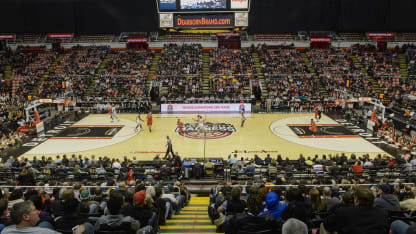
© Chris Farina/Oakland University Athletics
"Once Oakland went to the Horizon League, that meant you were going to have this rivalry with Detroit Mercy, now was that going to be a big deal or not," Wilson said. "As it turned out, it was and you started seeing the coverage it received in the paper, they may not cover too much of your game against Wright State, but when those two teams got together there was enough, either real or imagined, animosity between the coaches or the players or the institutions.
"It got tremendous coverage, great turnouts, capacity crowds certainly at Oakland, that we started thinking, 'We could be getting on the ground floor of something here.'"
Wilson also believes that Motor City Madness could evolve into a destination spot for the student bodies of the Horizon League schools and be a showcase for the city of Detroit.
"Our goal was to have all these young people come here year after year after year," Wilson said. "Come here as a sophomore and I know we'll get you back as a junior and a senior. Tell your friends and this will become a tradition.
"Detroit showed exceptionally well (last year), we had decent crowds but more than anything, in their off time they discovered maybe a different Detroit than they felt they were going to experience with the restaurants and the different things that the young people can do down here.
"It was a really important first step for us as a future arena (Motor City Madness moves to Little Caesars Arena next season) and as a city to have something like this that is being broadcast back to many different areas and to have these ambassadors in Green Bay, Milwaukee and Chicago.
"People will come back and bring their friends and families and then it will be something great."
Sometime Tuesday night the book will close on basketball being played at Joe Louis Arena.
For a city game played in an arena named after a sports icon, it was a satisfying journey.

